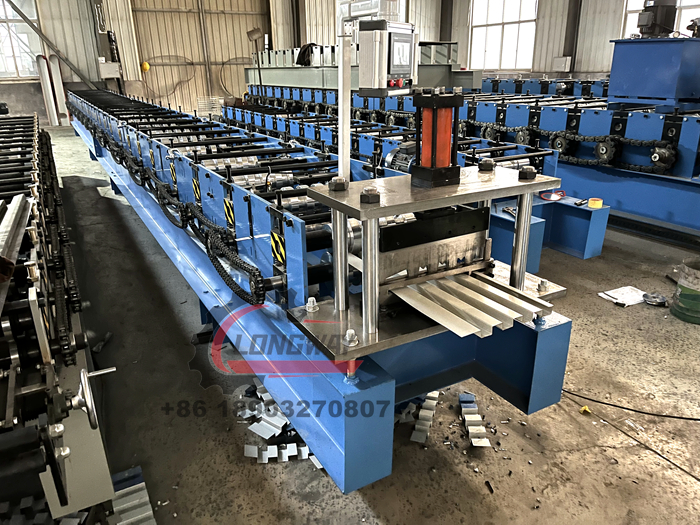Cold Roll Forming Equipment Manufacturers for Efficient Metal Processing Solutions
The Role of Cold Roll Forming Machine Factories in Modern Manufacturing
Cold roll forming is an essential manufacturing process that plays a critical role in the production of a wide variety of metal products. This technique involves the continuous bending of thin strips of metal into specific shapes and sizes without the need for heating, resulting in products that are both lightweight and strong. Cold roll forming machine factories are at the forefront of this innovative technology, providing the equipment and expertise necessary to meet the rising demand for high-quality metal components in various industries.
The Process of Cold Roll Forming
The cold roll forming process begins with a flat strip of metal, typically steel or aluminum, which is fed into a series of rollers. Each roller incrementally shapes the metal strip into the desired profile. This is achieved through a sequence of bending and contouring actions that are carefully calibrated to create precision components. As the metal moves through the rollers, it retains its physical properties, resulting in minimal distortion and maintaining strong structural characteristics.
This method is not only efficient but also highly versatile. It can produce a vast array of products, including metal framing, roofing materials, and automotive parts. The ability to create complex shapes and designs makes cold roll forming particularly valuable in modern manufacturing, allowing for innovation in product design while also optimizing material usage.
Advantages of Cold Roll Forming
One of the primary advantages of cold roll forming is its economic efficiency. The process minimizes waste, as excess material can often be reused or saved. Additionally, because cold roll forming does not require heating, the energy costs associated with production are significantly reduced. The speed of production is another factor; cold roll forming machines can operate at high speeds, producing large quantities of products in a short time frame.
Moreover, components produced through cold roll forming exhibit high dimensional accuracy and consistent quality. This is vital in industries such as automotive and construction, where precision is critical to ensure compatibility and safety. The process also results in stronger, more durable products due to the inherent work-hardening of the metal during forming.
cold roll forming machine factories

The Role of Cold Roll Forming Machine Factories
Cold roll forming machine factories are integral to the successful implementation of this technology. These factories design and manufacture the specialized machinery needed for the cold roll forming process. This includes the development of custom tooling and dies that cater to specific product requirements. Factories also conduct rigorous testing and quality control to ensure that their machines perform optimally and reliably.
In addition to manufacturing machines, cold roll forming factories provide valuable services such as consultancy and technical support. Their expertise can assist businesses in optimizing their production processes, selecting the right materials, and ensuring that their operations are efficient and compliant with industry standards.
Market Demand and Future Trends
The demand for cold roll forming machines is experiencing significant growth, driven by several factors. The increasing need for lightweight and durable materials in sectors such as construction, automotive, and aerospace is propelling manufacturers to adopt cold roll forming technologies. Additionally, as industries continue to push for sustainable practices, the reduced material waste associated with cold roll forming makes it an attractive option.
Looking forward, advancements in automation and control technologies are expected to enhance the capabilities of cold roll forming machines. The integration of Industry 4.0 concepts, such as IoT connectivity and artificial intelligence, could lead to smarter production processes, improved efficiency, and enhanced product quality.
Conclusion
Cold roll forming machine factories are pivotal players in the landscape of modern manufacturing. By providing innovative machinery and expertise, these factories are helping industries harness the benefits of cold roll forming technology. As market demands evolve and the push for efficiency and sustainability continues, cold roll forming is set to remain a key process in the production of high-quality metal components. The future holds promise for further development and innovations, ensuring that cold roll forming will keep pace with the ever-changing needs of the manufacturing sector.
-
Roof Panel Machines: Buying Guide, Types, and PricingNewsJul.04, 2025
-
Purlin Machines: Types, Features, and Pricing GuideNewsJul.04, 2025
-
Metal Embossing Machines: Types, Applications, and Buying GuideNewsJul.04, 2025
-
Gutter Machines: Features, Types, and Cost BreakdownNewsJul.04, 2025
-
Cut to Length Line: Overview, Equipment, and Buying GuideNewsJul.04, 2025
-
Auto Stacker: Features, Applications, and Cost BreakdownNewsJul.04, 2025
-
Top Drywall Profile Machine Models for SaleNewsJun.05, 2025








